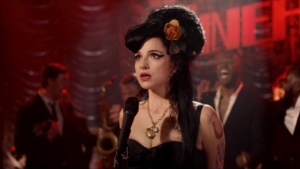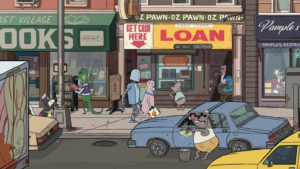Reviewed by GREG KING
Director: Justin Chadwick
Stars: Idris Elba, Naomie Harris, Deon Lotz.
The recent death of Nelson Mandela lends an extra significance and poignant quality to this earnest but fairly conventional biopic. Mandela was of course the inspirational anti-apartheid activist, the political prisoner turned politician, and Nobel-prize winning elderly statesman who led South Africa through its turbulent transition from racist state to a period of equality and black rule. And Clint Eastwood’s Invictus showed how the wily politician used the Rugby World Cup to showcase the new, free South Africa to the world.
Mandela: Long Walk To Freedom is based on Mandela’s own 1995 autobiography and unfolds in chronological fashion, spanning some fifty years. This ambitious and sprawling film traces Mandela’s life from his humble early years raised in a small, remote village to his time as a lawyer fighting persecution and injustice in Johannesburg in the 1940s, and his gradual involvement in politics as he joined the radical African National Congress in their fight against the repressive new laws passed by the South African government that eventually became the building blocks for apartheid.
As the ANC becomes more violent in its response to the oppressive laws and the unyielding authorities, Mandela finds himself a wanted man, accused of acts of terrorism against the state. Eventually he is arrested, and sentenced to life imprisonment on the infamous Robben Island penal settlement, where he endures harsh treatment, physical punishment and periods of solitary confinement. But despite his brutal treatment and his isolation from the rest of the country, Mandela continually urges a peaceful end to apartheid and transition to black rule. “If I can forgive them, then you can forgive them too,” he says in his televised address to the nation, a thoughtful speech that turned the tide in the struggle for equality. This puts him at ideological odds with his second wife Winnie, who urged violence and retribution against the white race.
The director here is Justin Chadwick, whose previous film was the underrated The First Grader, an emotionally manipulative drama about an elderly man attending primary school for the first time and whose life was changed after he learned to read and write. That was an inspiring tale, and this biopic about one of the most inspirational leaders of the 20th century should have resonated just as strongly. But the plodding script, written by playwright William Nicholson (Shadowlands, Gladiator, Les Miserables, etc) merely resembles an episodic, Cliffs Notes-like retelling of Mandela’s story, touching all the key highlights, but lacking any real depth or insight or controversy.
However, Mandela’s life story cannot be easily compressed into 145 minutes, and the film only seems to scratch the surface. It also lacks the gravitas and insights of far superior biopics about other inspirational leaders who changed the course of their country’s history, such as Richard Attenborough’s multi-Oscar winning Gandhi.
And Chadwick’s treatment of the oppressive apartheid regime and the treatment of black South Africans who were denied basic human rights, only scratches the surface. The appalling realities of South Africa in the era of apartheid have been more forcefully explored in films like John G Avildsen’s powerful and effective The Power Of One and Attenborough’s own Cry Freedom. Chadwick has carefully incorporated some archival footage to lend authenticity to those scenes which depict how the rest of the world protested against South Africa and its policy of racial separation.
Technically the film is proficient, and period detail, costumes and settings all reek of authenticity. The film was shot on location in South Africa itself, allowing cinematographer Lol Crawley (Four Lions, Hyde Park On Hudson, etc) to capture some gorgeous landscapes and beautiful scenery, which offers a stark contrast to the ugliness of those scenes set on the former leper colony of Robben Island or in the black townships of South Africa.
The film belongs to British actor Idris Elba, best known to television audiences for his roles in Luther and the gritty The Wire, who delivers a solid and earnest performance here as the eponymous Mandela. He doesn’t portray him as a saint, but rather as a flawed man who makes mistakes and errors of judgment in his early years. He charts his growth from womanising lawyer to revered statesman effectively. And although he doesn’t physically resemble Mandela he captures his mannerisms and speech patterns, and subtly grows into the role as the character ages.
Bond girl Naomie Harris (Skyfall, etc) is also excellent in a more complex, layered role as the angry, bitter and driven Winnie, who urges violence against the white regime, which puts her at odds with the gentle and wise Nelson. The rest of the secondary characters basically blur and are largely forgettable, and it is hard to identify with them or sympathise with them as they are treated fairly superficially. Only Deon Lotz, from Beauty, registers as a more sympathetic prison guard.
Unfortunately, the film fails to engage as emotionally as it should. Following Invictus, which gave a great representation of Mandela the statesman and featured a great performance from Morgan Freeman that captured the essence of the man, Mandela: Long Walk To Freedom seems unwieldy by comparison. Coming hot on the heels of other worthy biopics exploring the history of racial politics like The Butler and the grueling 12 Years A Slave, it may also suffer at the local box office.
★★★




